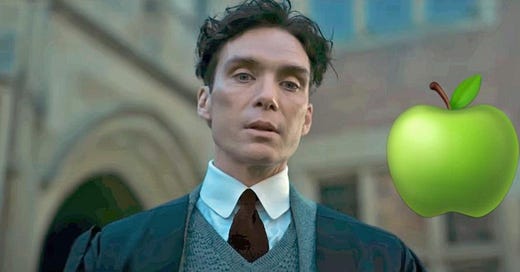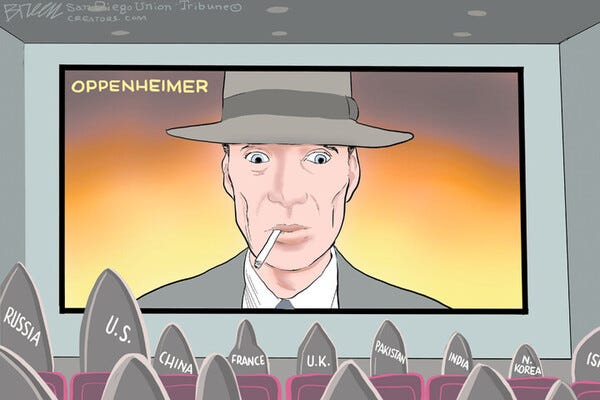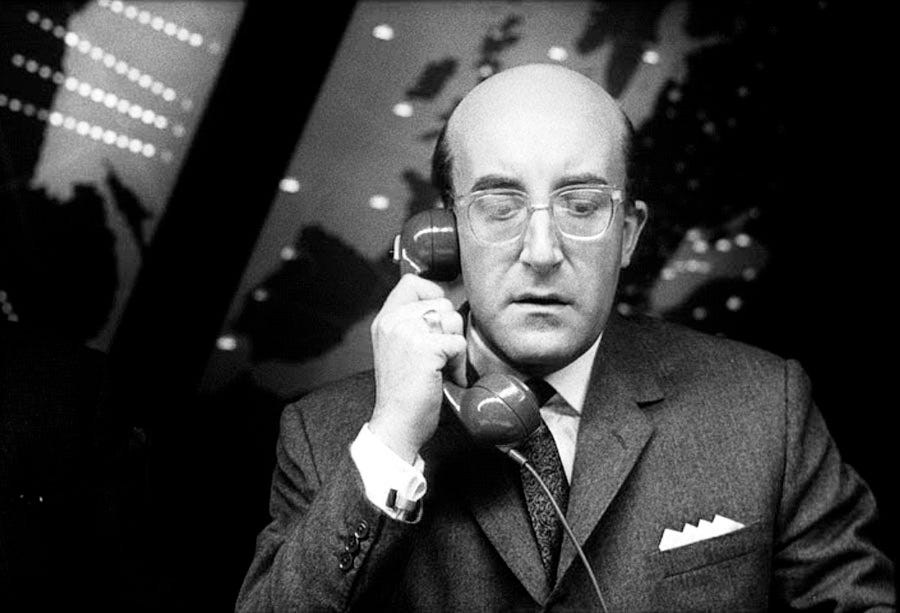Greg Mitchell is the author of a dozen books, including “Hiroshima in America,” “Atomic Cover-up,” and the recent award-winning“The Beginning or the End: How Hollywood—and America—Learned to Stop Worrying and Love the Bomb.” He has directed three documentary films since 2021, including two for PBS (plus award-winning “Atomic Cover-up”). He has written widely about the atomic bomb and atomic bombings, and their aftermath, for over forty years.
Starting nearly two weeks ago, after I saw an early screening, I have been directing attention here to the absence in Oppenheimer of any mention of the drifting radioactive cloud that imperiled people after the Trinity test—and later the dozens of other dangerous nuclear tests in the Southwest—along with new legal challenges raised by “downwinders.” Yesterday there was a heartening, if not yet conclusive response to press coverage sparked by the movie. The U.S. Senate approved a measure that would, for the first time, give health care benefits and compensation to people living in communities downwind from the Trinity site.
New Mexico Sen. Ben Ray Lujan led the effort. As part of the gargantuan Defense bill, it now faces revision and approval in the House.
There was another very interesting, if quite different and less consequential, Oppenheimer-related news flash yesterday. The physicist’s grandson raised questions in an interview about the “one scene” he wished had been deleted from the movie: the notorious Poisoned Apple incident. He called it nothing more than “unsubstantiated rumor.”
Now, I’d known about this purported episode for quite some time, having read about it years ago in the book on which the movie is based, American Prometheus, by two of my friends, Kai Bird and the late Marty Sherwin. When I saw it depicted in the movie, I was still kind of shocked by the mind-boggling notion of the young Oppie, angry at his professor, injecting an apple with cyanide in hopes that the poor man would take a bite, and (presumably) die. But mainly I wondered if many other moviegoers would believe that this was surely typical Hollywood fiction or at least a wild exaggeration.
Now comes Charles Oppenheimer to reveal that he never did trust the account in the book and hates it now: “That’s a really serious accusation and it’s historical revision. There’s not a single enemy or friend of Robert Oppenheimer who heard that during his life and considered it to be true.” He also claims that Bird and Sherwin admitted in their book, now again a bestseller, “We don’t really know if it happened. There’s no record of him trying to kill somebody.”
But do they say this in their book? Not quite.
The poisoning and its aftermath take up a little more than one page in the 700-page volume. From the footnotes, it appears to be based on Sherwin’s June 1979 interview with an Oppie friend, Francis Fergusson. The narrative treats it as fact, but oddly puts “poisoning” in quotes, then refers to “alleged poison,” and includes a comment by another friend referring to “an imaginary apple, or a real apple, whatever it was….” Then it quotes Fergusson asserting that Robert had confessed to him that he had “kind of poisoned” his teacher and used cyanide “or something somewhere.”
The authors then say that if the dose had been lethal, Robert faced murder charges. Then they add: “But this seems improbable…More likely Robert had laced the apple with something that merely would have made Blackett sick.”
What seems uncontested is that Cambridge officials in the same period considered expelling him and ordered Oppenheimer to see a psychiatrist for an extended period. But was this inspired by a poisoned apple? He was by all accounts a mental wreck for all sorts of reasons during this time, and sometimes disruptive in class, and it could have been unrelated.
We may never know the truth, but Nolan certainly took it and ran with it—and even added Nils Bohr to the scene with apple in hand.
Your humble scribe decided one week ago to attend another screening of Oppenheimer, as I came away from the first one (a preview) feeling some of the dialogue was muddy or muddled, a not uncommon complaint. I wanted to make sure that I didn’t miss key points raised by characters, since I was already writing daily about the fine movie, and its flaws, but perhaps missing something. So I booked a seat at the local mall for the daily “open captioning” version.
Then, fun story, life intervened. A piece I had just submitted to Mother Jones had been accepted quickly and slated to run the next day, but they had the usual 30 queries that I had to respond to. So, just twenty minutes into my re-view, I had to flee the mall, usually not a bad thing but in this case, unfortunate.
It took another week to re-trace my steps, which I did yesterday. Fortunately for my past scribbling, I did not find anything that changed any of my opinions or claims about the movie, even with fresh snippets of talking now decipherable. Well-written script. But man, I had missed the fun line where Oppie tells his mistress (no, not Jean Tatlock, the other one), when she said she didn’t know the whereabouts of her husband, “you always seem to know when it really matters,” or words to that effect.
A few other points or queries:
—Still felt it was a very well-made movie that everyone should see but, egad, the omissions (see my previous daily entries).
—That key scene, meant to cover for the total lack of images of Japanese victims, when Oppie has a few visions during his celebratory pep talk after Hiroshima and sees a burned American girl (played by Nolan’s daughter) for about 2.5 seconds: It opens with a very brief cry, which I took to be a woman but others say it’s a baby. Anyone have an opinion?
—I had noted that the movie near its final moments does put a number on Japanese victims but now I could hear/read that it was 220,000. However, this gets relayed by Oppenheimer in the shouting match with Robb, his prosecutor, with much talking over—plus loud effects on the soundtrack—so I don’t see how most viewers with captioning might actually hear it.
—As I had observed earlier, there’s virtually no mention of radiation, in any context, but now I heard Oppie, as Trinity test readied, claim that “evacuation plans are in order.” Of course, this is absurd as none of the local villagers were warned, let alone evacuated. Perhaps he was referring to the danger to the scientists/military observers, which makes the total absence of reference to “downwinders” all the more appalling.
—Sadly, as I had believed, Jean Tatlock has no substance at all: they hook up and who knows her background (beyond being a devoted Communist), even when we meet her again (when she’s completed medical school and is a well-regarded psychiatrist) when our boy sneaks away from Los Alamos. And Nolan’s sex scenes are even more laughable than I recall.
—Without providing a true spoiler here, let’s just say that the final revelations about Lewis Strauss are telegraphed more loudly than in my memory. And still: way too much Strauss in the movie than necessary!
—If you don’t know, the prof Oppie nearly poisoned went on to write the first important book that raised questions about the decision to drop the bomb.
Reminder, you can subscribe to this daily newsletter for free:
An exhaustive survey of nuclear-related films since the 1950s, at Truthdig, some of which I’ve forgotten, but have seen. Not many related to the making and use of bomb but wider scope. Not mentioned, but that’s okay: My 2021 film Atomic Cover-up (based on my book).







Re Truthout’s non-exhaustive survey- how can I screen Atomic Cover-Up? Not shocked that I can’t find it available online anywhere, hoping there might be new film festivals/screening opportunities in the near future?